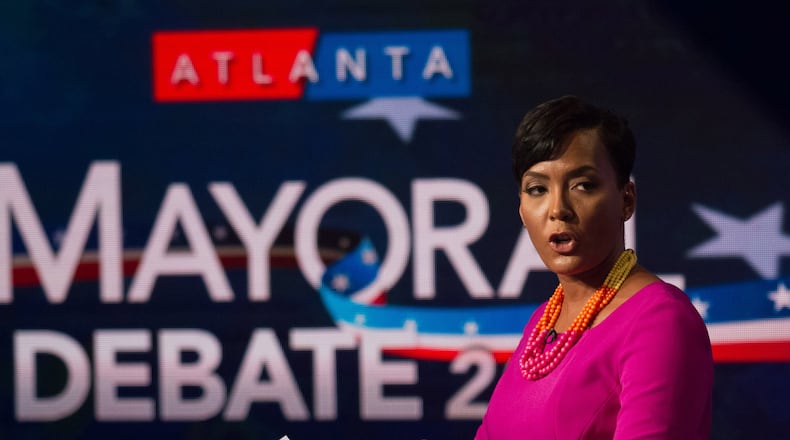On Mayor-elect Keisha Lance Bottoms’ campaign website more than a dozen statements begin with two words: “I will.”
The pledges, which vary in specificity, are her plans to tackle an array of problems that Atlantans have confronted for decades.
The time for her to deliver begins Tuesday afternoon. Bottoms will be sworn in as the 60th mayor of Atlanta — only the second woman ever to hold that job — at the Morehouse College Martin Luther King Jr. International Chapel.
During her campaign, Bottoms found a strong ally in her predecessor Mayor Kasim Reed, who shored up the city’s finances over his two terms in office and created a thriving business environment. His staff boasts of the city’s eight consecutive credit ratings increases, record reserves of $200 million and having 18 regional or national headquarters relocate to Atlanta.
But while the city’s coffers and business community flourished under Reed, his critics say not everyone benefited. On the campaign trail, the mayor-elect seemed to acknowledge that, co-opting one of her former opponents’ slogans:
While the city had been good at building buildings, it had not always been so good at building people.
As such, some of her most concrete campaign promises deal with education and affordable housing.
Bottoms’ campaign also addressed other areas that Reed’s critics seized on, including bribery scandals at City Hall.
Some of Bottoms’ goals are easy to achieve. Others involve complicated solutions to intractable problems that long beset the city.
THE DEEDS
In the 1970s, when the Atlanta Public Schools split from the City of Atlanta, the city retained the deeds to school properties. It wasn’t an issue until the past few years when the school district sought to sell off buildings it no longer needed.
The district has said it needs cash to fund educational initiatives, but Reed sought to attach conditions to the sales, so that a portion of the property would be redeveloped for affordable housing.
The disagreement sparked a lawsuit and ongoing bitter public fight.
At an educational forum four days prior to the Dec. 5 runoff, Bottoms and her opponent, Mary Norwood, said, if elected, they would turnover the disputed deeds on the first day of a new administration.
Atlanta Public Schools’ Superintendent Meria Carstarphen took note of that and other promises Bottoms made, including using some of the city’s reserve funds to help with troubled schools.
In a meeting with the editors of The Atlanta Journal-Constitution on Dec. 18, Carstarphen mentioned those “big commitments” and others from Bottoms and said she wants to help Bottoms “be successful.”
As for turning over the property deeds, incoming City Council President Felicia Moore said she couldn’t speak for rest of the city council, but she has supported the move.
“I don’t see any major issues,” Moore said.
A school district spokesman was still researching a question about whether the district had observed any preliminary signs that the city intended to drop its claim to the property.
Bottoms couldn’t be reached to respond to questions about preliminary actions she’s taken to fulfill some of her campaign pledges.
TRUST FUND OF $1 BILLION
To address the city’s dearth of affordable housing, Bottoms has proposed “public-private plan to raise ($1 billion) in dedicated funding to fight displacement to ensure that Atlanta has enough quality, safe, affordable housing for all our communities.”
She hasn’t publicly identified a specific source of funding.
“I don’t know of any source of city funds,” said Invest Atlanta Board Member Julian Bene. “Finding that money would be competing with money to pay our cops.”
Despite the infusion of new businesses into the city, Atlanta’s tax base is stagnant when compared to the rate of inflation, Bene said. He attributed that phenomenon partly to tax subsidies provided to developers and to undervalued property on the tax rolls.
The other problem is that $1 billion may not make much of a dent in the problem. Bene recalled two recent developments in which the city provided developers with roughly $200,000 in incentives per unit of affordable housing.
“At that rate, even $1 billion doesn’t get you very much,” Bene said.
INDEPENDENT AUDITOR
Reed leaves office in the middle of a federal bribery investigation. He’s not been named as a suspect and vowed to cooperate with the investigation.
During the mayor campaign, inaccuracies in Bottoms' campaign finance disclosures prompted questions about transparency.
As critics tried to associate her with corruption at City Hall, Bottoms responded by announcing her “Ethics and Transparency Reform Act of 2018.”
The 10-point proposal, among other things, requires candidates for elected office to file five years worth of tax returns with the city clerk and calls for the appointment an independent auditor to review the city’s procurement process — a focus of the federal investigation, which has already resulted in a guilty plea from the city’s former chief procurement officer, Adam Smith.
Moore said the city already had a independent auditor and that perhaps it was only a matter of asking for an audit of the procurement process.
About two weeks after Bottoms defeated Norwood, U.S. Attorney Byung J. "BJay" Pak announced on the radio the public might see an uptick in investigative activity in the case now that the elections are over.
He declined to provide a timeline but acknowledged the intangible trouble the inquiry brings a new mayor.
“We are sensitive to the fact the longer it lasts it may cast a cloud over the administration,” Pak said.
Staff writer Vanessa McCray contributed to this report.
About the Author
Keep Reading
The Latest
Featured



